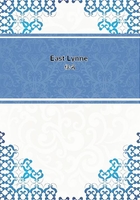
第123章
"I do not look for it. The tenants leave your house in March, do they not?"
"Yes, they do," snapped Miss Corny. "But as we are on the subject of details of ways and means, allow me to tell you that if you did what is right, /you/ would move into that house of mine, and I will go to a smaller--as you seem to think I shall poison Barbara if I remain with her. East Lynne is a vast deal too fine and too grand for you."
"I do not consider it so. I shall not quit East Lynne."
"Are you aware that, in leaving your house, I take my income with me, Archibald?"
"Most certainly. Your income is yours, and you will require it for your own purposes. I have neither a right to, nor wish for it."
"It will make a pretty good hole in your income, the withdrawing of it, I can tell you that. Take care that you and East Lynne don't go bankrupt together."
At this moment the summons of a visitor was heard. Even that excited the ire of Miss Carlyle. "I wonder who's come bothering to-night?" she uttered.
Peter entered. "It is Major Thorn, sir. I have shown him into the drawing-room."
Mr. Carlyle was surprised. He had not thought Major Thorn within many a mile of West Lynne. He proceeded to the drawing-room.
"Such a journey!" said Major Thorn to Mr. Carlyle. "It is my general luck to get ill-weather when I travel. Rain and hail, thunder and heat; nothing bad comes amiss when I am out. The snow lay on the rails, I don't know how thick; at one station we were detained two hours."
"Are you proposing to make any stay at West Lynne?"
"Off again to-morrow. My leave, this time, is to be spent at my mother's. I may bestow a week of it or so on West Lynne, but am not sure. I must be back in Ireland in a month. Such a horrid boghole we are quartered in just now!"
"To go from one subject to another," observed Mr. Carlyle; "there is a question I have long thought to put to you, Thorn, did we ever meet again. Which year was it that you were staying at Swainson?"
Major Thorn mentioned it. It was the year of Hallijohn's murder.
"As I thought--in fact, know," said Mr. Carlyle. "Did you, while you were stopping there, ever come across a namesake of yours--one Thorn?"
"I believe I did. But I don't know the man, of my knowledge, and I saw him but once only. I don't think he was living at Swainson. I never observed him in the town."
"Where did you meet with him?"
"At a roadside beer-shop, about two miles from Swainson. I was riding one day, when a fearful storm came on, and I took shelter there.
Scarcely had I entered, when another horsemen rode up, and he likewise took shelter--a tall, dandified man, aristocratic and exclusive. When he departed--for he quitted first, the storm being over--I asked the people who he was. They said they did not know, though they had often seen him ride by; but a man who was there, drinking, said he was a Captain Thorn. The same man, by the way, volunteered the information that he came from a distance; somewhere near West Lynne; I remember that."
"That Captain Thorn did?"
"No--that he, himself did. He appeared to know nothing of Captain Thorn, beyond the name.
It seemed to be ever so! Scraps of information, but nothing tangible.
Nothing to lay hold of, or to know the man by. Would it be thus always?
"Should you recognize him again were you to see him?" resumed Mr. Carlyle awakening from his reverie.
"I think I should. There was something peculiar in his countenance, and I remember it well yet."
"Were you by chance to meet him, and discover his real name--for I have reason to believe that Thorn, the one he went by then, was an assumed one--will you oblige me by letting me know it?"
"With all the pleasure in life," replied the major. "The chances are against it though, confined as I am to that confounded sister country.
Other regiments get the luck of being quartered in the metropolis, or near it; ours doesn't."
When Major Thorn departed, and Mr. Carlyle was about to return to the room where he left his sister, he was interrupted by Joyce.
"Sir," she began. "Miss Carlyle tells me that there is going to be a change at East Lynne."
The words took Mr. Carlyle by surprise.
"Miss Carlyle has been in a hurry to tell you," he remarked--a certain haughty displeasure in his tone.
"She did not speak for the sake of telling me, sir, it is not likely; but I fancy she was thinking about her own plans. She inquired whether I would go with her when she left, or whether I meant to remain at East Lynne. I would not answer her, sir, until I had spoken to you."
"Well?" said Mr. Carlyle.
"I gave a promise sir, to--to--my late lady--that I would remain with her children as long as I was permitted. She asked it of me when she was ill--when she thought she was going to die. What I would inquire of you, sir, is, whether the change will make any difference to my staying?"
"No," he decisively replied. "I also, Joyce, wish you to remain with the children."
"It is well, sir," Joyce answered, and her face looked bright as she quitted the room.